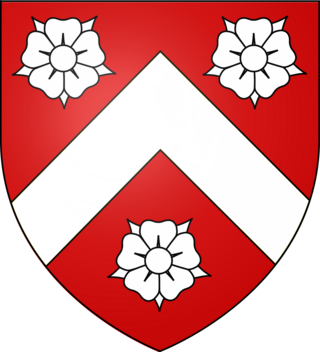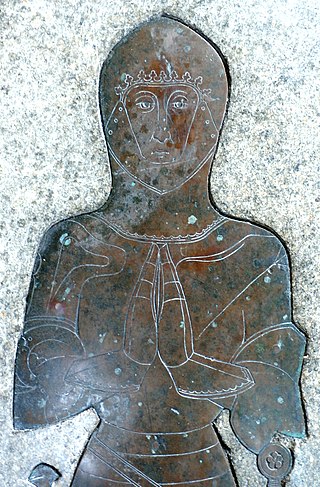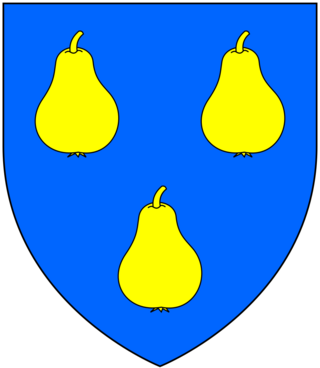
Sir John VI Lisle (1406-1471) was an English landowner, soldier, administrator, and politician from Wootton on the Isle of Wight. [1] [2]

Sir John VI Lisle (1406-1471) was an English landowner, soldier, administrator, and politician from Wootton on the Isle of Wight. [1] [2]
Born about 1406, [3] he was the son and heir of the MP Sir John V Lisle and his wife Margaret Bramshott, daughter of John Bramshott. [1] [2] Prominent since the time of King Stephen on the Isle of Wight, then part of Hampshire, the Lisle family wrote their name in Latin as “de Insula” and in French as “de l'Isle”, both meaning “of the Island”. As well as supplying Sheriffs and MPs for the county, two of his ancestors had been summoned to Parliament as barons under King Edward I.
By 1427 he reached majority, in that year being first included in the electoral roll for Hampshire and in 1433 being elected as the county's Member of Parliament. [2] Knighted in 1436, he served as Sheriff of Wiltshire in 1438 and then as Sheriff of Hampshire in 1439. [2] From 1440 to 1470 he was appointed to at least 40 royal commissions in Hampshire and sat as a justice of the peace for the county from 1441 until his death. [1] [2]
After military service in the Duke of Somerset's expedition that sailed to France in 1443, [1] he returned to England and in 1448 acquired the wardship of John Philpot, who he married to one of his daughters. [2] After serving a second term as MP for Hampshire in the Parliament of February 1449, [2] he went back to the war in France, serving in 1453 as a King's knight in Aquitaine with a force of 20 spearmen and 200 archers. [1] In 1461 he rallied to Yorkist rule and, pardoned with other Lancastrians in 1462, then served on Yorkist royal commissions. [2]
He made his will on 21 October 1468, asking to be buried at Thruxton in Hampshire, and died on 21 January 1471, [1] [2] leaving to his son lands in the Isle of Wight, Wiltshire, Dorset, and Devon. [2] His will was proved on 6 November 1471. [2]
He married Anne Botreaux, daughter and heiress of John Botreaux and niece of William VI Botreaux, 3rd Baron Botreaux, [1] with whom he had the four children named in his will: [2]
After his first wife's death, he married Isabel, widow of Richard Horne [2] [1] and mother of Gervase Horne (born about 1454), [1] who survived him and acted as one of his executors. [1] [2] They had two children named in his will:
She married a third time to Thomas Beauchamp and died on 7 October 1484. [1]

Walter Hungerford, 1st Baron Hungerford was an English knight and landowner, from 1400 to 1414 a Member of the House of Commons, of which he became Speaker, then was an Admiral and peer.
Thruxton is just off the A303 road five miles (8.0 km) west of Andover. It is a village with a Manor House, thatched cottages and village green. Pillhill Brook runs from Thruxton Down through the grounds of the Manor House and along the village street to Mullen's Pond, a natural habitat for many species of migratory birds and wild plants.

Alexander Popham of Littlecote, Wiltshire, was an English politician who sat in the House of Commons at various times between 1640 and 1669. He was patron of the philosopher John Locke.

Sir Edward Rogers was an English gentleman who served as an Officer of State in various capacities during the Tudor period. He rose to become Comptroller and Vice-Chamberlain of the Household to Elizabeth I of England from 1560 to 1568.
John Hooke was an English politician who sat in the House of Commons between 1659 and 1661.

Sir Maurice Russell, JP of Kingston Russell, Dorset and Dyrham, Glos. was an English gentleman and knight. He was a prominent member of the Gloucestershire gentry. He was the third but eldest surviving son and heir of Sir Ralph Russell (1319–1375) and his wife Alice. He was knighted between June and December 1385 and served twice as Knight of the Shire for Gloucestershire in 1402 and 1404. He held the post of Sheriff of Gloucestershire four times, and was Coroner and Justice of the Peace, Tax Collector and Commissioner of Enquiry. His land holdings were extensive in Gloucestershire, Somerset, Dorset, Berkshire and Buckinghamshire. He was descended from an ancient line which can be traced back to 1210, which ended on the death of his son Thomas, from his second marriage, as a young man without male issue. Most of his estates, despite having been entailed, passed at his death into the families of his two daughters from his first marriage.
Sir Henry Worsley, 2nd Baronet, was an English politician who sat in the House of Commons of England in 1640 and from 1660 to 1666. He supported the Parliamentarian side in the English Civil War.

John Seymour of Stapleford in Wilton, Wiltshire, and of Wulfhall in Savernake Forest, Wiltshire was an English landowner and Member of Parliament.

John Seymour of Wulfhall, of Stalbridge, of Stinchcombe and of Huish, all in Wiltshire, England, was warden of Savernake Forest and a prominent member of the landed gentry in the counties of Wiltshire, Somerset and Dorset. He was the grandfather of Jane Seymour, the third wife of King Henry VIII, and was thus great-grandfather of King Edward VI.
John Bulkeley was an English politician who sat in the House of Commons at various times between 1640 and 1662.

The Great Budbridge Manor is a manor house just south of Merstone, near Arreton, Isle of Wight, England. Fish ponds on the grounds appear medieval.
Cleaveland Manor is a manor house on the Isle of Wight, situated within the Victoria parish.
Sir Richard Worsley, 1st Baronet, was an English landowner and politician who sat in the House of Commons between 1614 and 1621.

Sir Nicholas Wadham was an English landowner, courtier, politician, and civil and military administrator from Somerset. His inherited landholdings over three counties included Merryfield in Ilton in Somerset, Catherston Leweston in Dorset, and Edge in Branscombe in Devon.
Sir John Berkeley, of Beverston Castle, Gloucestershire was an English politician. He was knighted before 1383.

Sir William Moleyns was an English landowner, administrator and politician from Stoke Poges in Buckinghamshire.

Sir William Cary (1437–1471) of Cockington and Clovelly in Devon was a member of the Devonshire gentry. He was beheaded after the defeat of the Lancastrians at the Battle of Tewkesbury in 1471.

Sir William Wadham (c.1386–1452) of Merryfield in the parish of Ilton, Somerset and Edge in the parish of Branscombe, Devon came from a West Country gentry family with a leaning towards the law, who originally took their name from the manor of Wadham in the parish of Knowstone, between South Molton and Exmoor, north Devon.

Richard Stucley, of Merston and Chewton Mendip, was an English landowner, administrator and politician who married an heiress and through his son Hugh, who also married an heiress, became the ancestor of a major Devon family.
Sir John Willoughby, of Brook, was an English landowner, administrator, soldier and politician who was elected as MP for Wiltshire, where he lived, and for the adjoining seat of Somerset. He also served terms as High Sheriff for both counties.